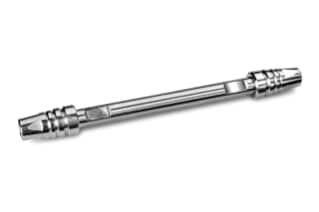
Waters is phasing out Certificate of Analysis (COAs) for eCords. All column documents are now available at www.waters.com/coa
|
Separation Mode |
SuperCritical Fluid (SFC) |
|
Particle Substrate |
Hybrid |
|
Maximum Pressure |
6000 psi (415 Bar) |
|
Endcapped |
No |
|
Silanol Activity |
Medium |
|
Particle Shape |
Spherical |
|
Particle Size |
3.5 µm |
|
Endfitting Type |
Parker-style |
|
Pore Size |
130 Å |
|
Format |
Column |
|
BTO Flag |
true |
|
Surface Area |
185 |
|
System |
UPC2, SFC |
|
Particle Technology |
BEH |
|
Technique |
SFC, SFC/MS |
|
Inner Diameter |
3 mm |
|
Length |
150 mm |
|
eCord |
Yes |
|
UNSPSC |
41115711 |
|
Brand |
Viridis |
|
Product Type |
Columns |
|
Units per Package |
1 pk |

Viridis BEH Column, 130Å, 3.5 µm, 3 mm X 150 mm, 1/pk
The Viridis sub-2-µm and 3.5-µm columns exhibit exceptional efficiency and resolution and were created and tested for the ACQUITY UPC2 system. Even for well-retained basic achiral compounds, the decrease and control of surface silanol activity on Viridis particles produce good peak morphologies under SFC conditions without the addition of mobile-phase additives.
Achiral SuperCritical Fluid (SFC) selectivities are added by Viridis Columns. The various varieties in these columns are Ethylene Bridged Hybrid (BEH) particle technology, Charged Surface Hybrid (CSH) particle technology, and High-Strength Silica (HSS) particle technology. The lab equipment listed here is based on BEH. Outstanding peak geometries, particularly for well-retained basic achiral compounds, are produced by the decrease and modulation of surface silanol activity on Virids particles under SuperCritical Fluid (SFC) conditions.
Waters makes sure that only the highest standards and strictest guidelines are utilized in the production of the ACQUITY UPLC CSH C18 Columns, giving you the assurance that the lab equipment won't need to be replaced frequently and will produce reliable results. You can explore our website and consult our catalog to locate various products that are compatible with your setup or even to shop for lab equipment so you can restock your inventory and add to your existing equipment portfolio.
We also recommend that you check out QuanRecovery with MaxPeak, 700 µL Plates, 25/pk; QuanRecovery Plates with MaxPeak HPS, created by LC-MS bioanalysts for LC-MS bioanalysts, minimize peptide and protein losses caused by ionic interactions and non-specific binding. Higher recovery, sensitivity, and repeatability of analytical results are produced by reducing these losses. These 700-L 96-well plates have minimal residual volumes to completely use small sample quantities and are LC-MS autosampler ready. MaxPeak High Performance Surfaces are cutting-edge technologies created to maximize analyte/surface interactions that can result in sample losses while decreasing analyte recovery, sensitivity, and repeatability.
How Do You Define BEH Technology
The BEH (Ethylene Bridged Hybrid) particles are one of the main components of UPLC technology, available in a variety of pore diameters and bonded phases, enabling both reversed-phase and hydrophilic contact chromatography. The method is applicable to a variety of biopharmaceutical analyses, including small molecules to big molecules. Due to the inherent chemical stability of hybrid particle technology, a larger pH range [pH 1–12] is viable. This also makes it possible to design a flexible, reliable separation technology. The BEH particle technology enables a seamless transition between HPLC and UPLC technology platforms because it is available in a range of HPLC particle sizes [2.5, 3.5, 5, and 10 µm].